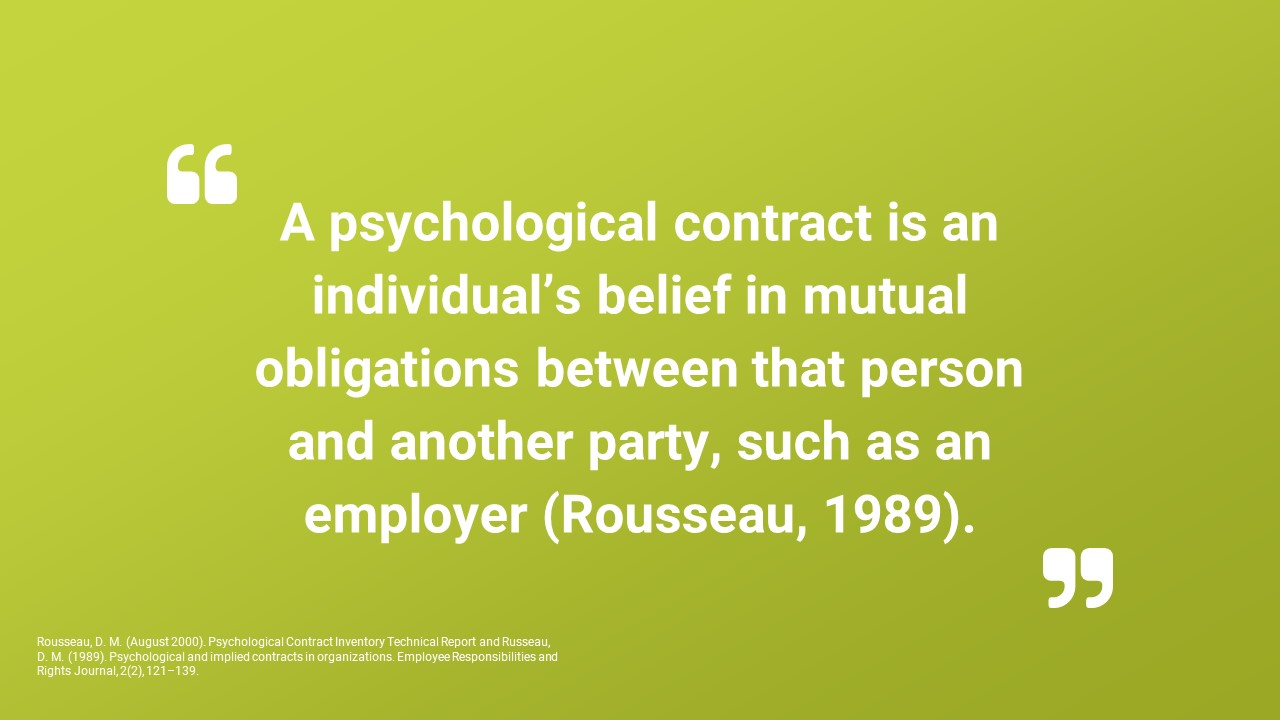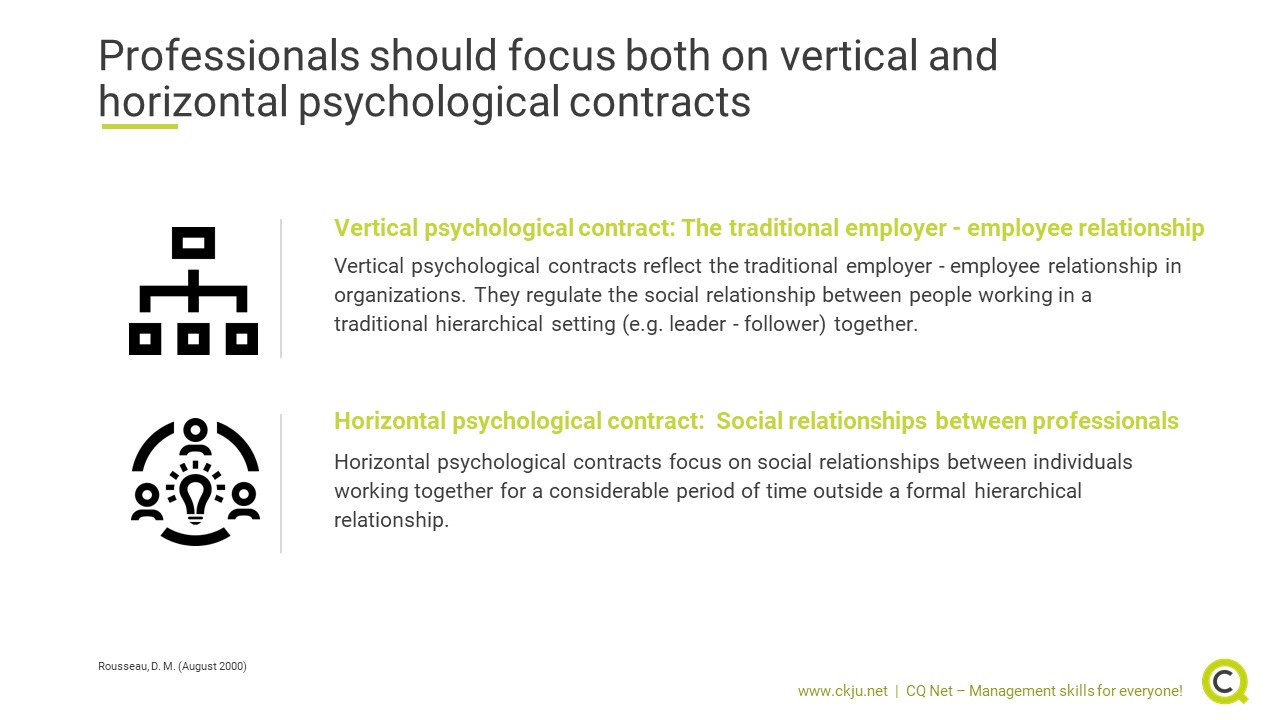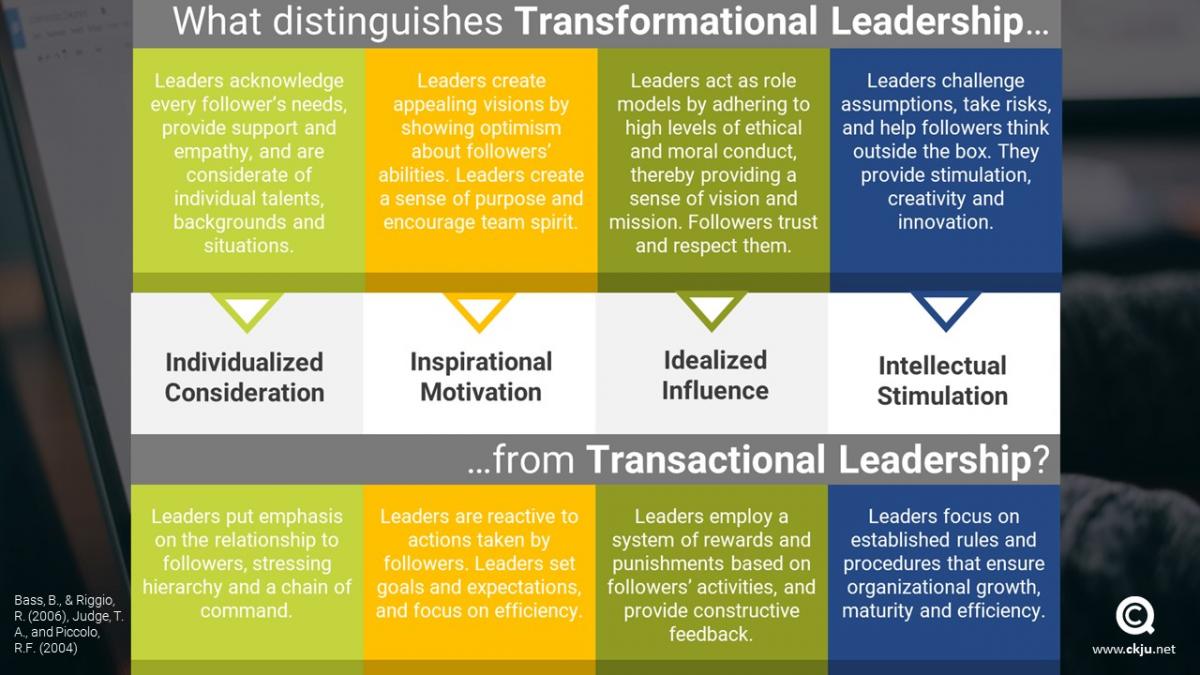- All Management Learning Resources
- psychological contracts

Executive summary
Over the last thirty years, the psychological contract between employer and employee has changed because of globalization and major advances in technology. Many employees are changing jobs more rapidly and the demonstration of commitment to one organization for a life-long career has declined. This CQ Dossier focuses on the concept of psychological contracts and raises several important questions.
- First, what is a psychological contract?
- Second, how can the psychological contract concept be utilized by management practitioners and professionals?
- Third, how strong is the body of evidence available behind psychological contracts?
- Finally, what is the added value of psychological contracts for professionals in general?
Contents
- Executive summary
- What is a psychological contract?
- The psychological contract is an unspoken agreement
- Psychological contracts are reciprocal and based on expectations
- The psychological contract is formed in the pre-employment stage
- Supervisor behavior has an impact on the psychological contract
- Performance management measures can have an impact on the psychological contract
- Breaches of the psychological contract occur when the employer does not deliver what was promised
- Organizational justice has an impact on the psychological contract
- How strong is the body of evidence available for psychological contracts?
- The body of evidence behind the psychological contract concept is strong
- Psychological contracts are an integral part of workplace dynamics
- Key take-aways
- References and further reading
What is a psychological contract?
The concept of psychological contract is described as the mutual beliefs, perceptions and informal obligations between an employer and an employee (Rousseau, 1989). The psychological contract impacts relationship dynamics and defines work duties and practices. However, it is not formalized so is considered distinct from any formal contract of employment which identifies job duties and specifications.
The psychological contract focuses more on the social relationship between the employer and employee. However, psychological contracts regulate more than the social releationship between employer and employees. Rousseau (2000) points out that
A psychological contracts is an individual's belief in mutual obligations between that person and another party, such as an employer (Rousseau, 1989).
This makes the psychological contract concept an important management tool for professionals in general. How does a psychological contract work?
The psychological contract is an unspoken agreement
The psychological contract involves an unspoken agreement that occurs between supervisors, employees and other individuals at work.
Vertical psychological contracts: The traditional employer - employee relationship
Vertical psychological contracts reflect the traditional employer - employee relationship in organizations. They regulate the social relationship between people working in a traditional hierarchical setting (e.g. leader - follower) together.
One example of a vertical psychological contract is the employee agreeing to be a productive worker who voices few grievances and the supervisor respecting informal employee norms such as providing autonomy (Coyle-Shapiro & Parzefall, 2008).
Horizontal psychological contracts: Social relationships between professionals
Horizontal psychological contracts focus on social relationships between individuals working together for a considerable period of time outside a formal hierarchical relationship.
An example of a horizontal psychological contract are team members working closely together in a long-term project to achieve a challenging goal. The team members agree to support each other within their area of expertise and respecting each other’s contribution to the project.
Consequently, a psychological contract is a philosophy rather than a devised plan and includes qualities like respect, compassion, and trust.
Psychological contracts are reciprocal and based on expectations
Psychological contracts are most important in their function within the workplace as defining the relationship between employer and employee. Psychological contracts are essential yet implicit agreements that are the foundation for employer-employee relationships because they are reciprocal and based on expectations (Rousseau, 2001).
There are several factors that impact psychological contracts such as (Rousseau, 2001)
- the degree of values congruence between employer and employee and
- organizational dynamics such as perceptions of organizational justice.
How can the concept of psychological contracts be utilized by management practitioners and professionals as a HR and leadership tool?
The psychological contract is formed in the pre-employment stage
Psychological contracts are an important phenomenon for management practitioners and professionals because they are present in several human resource management practices.
First the psychological contract is initially formed in the pre-employment stage (George, 2010) because job candidates form expectations and impressions about the potential employer through information gathered.
During the recruitment process, two–way communication occurs involving promise exchanges and so impacts the psychological contract.
Once an employee is hired, early socialization takes place with both employer and employee continuing to search for information about one another through multiple sources.
Supervisor behavior has an impact on the psychological contract
As employment continues, the search slows down as the employee gains experience and becomes affiliated with the organization. This period is important for management practitioners because it is when the psychological contract might change. For example, the employee will be more familiar with the management style of their supervisor and leaders and this impression can be either positive or negative depending on the behavior of the supervisor.
If the supervisor is more inclined towards a transactional leadership approach then this can lead to a more superficial relationship between the employer and employee because there is less development of trust and commitment (Rousseau, 2001).
Performance management measures can have an impact on the psychological contract
Most organizations also evaluate their employees on an annual basis as part of a performance management system. This evaluation can trigger changes in the psychological contract, which might be revised based on incentives and changes in agreements (George, 2010).
Breaches of the psychological contract occur when the employer does not deliver what was promised
Psychological contracts are also important to management practitioners when a breach occurs because psychological contract rely on promises between the employer and employee so trust is an important foundation for social exchanges (Ruiter, Schalk, Schaveling & Gelder, 2017).
Breaches in the psychological contract occur if employees perceive that the employer has not delivered on what was promised, or vice versa. Management practitioners can be influential in reducing breaches through increasing employer awareness of and respect for the contracts of the employees.
Organizational justice has an impact on the psychological contract
If organization activities are perceived to be unjust such as engaging in aggressive downsizing, then this can impact the organization’s reputation in the wider community (Ruieter et al., 2017). Management practitioners can advise employers on best practices in management of staff and how to foster effective psychological contracts.
How strong is the body of evidence available for psychological contracts?
Research on psychological contracts supports the basic theoretical propositions (Shapiro, 2019). In particular, the research by Denise Rousseau and other researchers provides more detail on psychological contracts (Rousseau, 1998, 2001).
Research also provides evidence that many employees experience a breach of the psychological contract several years after starting their job position (Conway & Briner, 2005) and research shows that this breach has a negative impact on employee productivity and retention (Robinson, 1996).
In addition, because of globalization and workplace changes, employees are expected to give more in terms of time and effort yet tend to receive less in terms of career opportunities and job security (Maslach, Schaufeli & Leiter, 2001). This violation of the psychological contract can lead to burnout because it challenges the reciprocal arrangement between employer and employee (Maslach et al., 2001).
A meta-analytic review also found support for the relationship between breaches of psychological contract and negative emotional reactions (Zhao et al., 2007) and additional research has supported the meta-analytic findings (Suazo, 2009).
The body of evidence behind the psychological contract concept is strong
Consequently, in terms of evidence, empirical research is quite rigorous in demonstrating the importance of psychological contracts; what is needed is more research on the theoretical underpinning of the phenomenon.
There is still some debate on the intricacies of how psychological contracts change over time and the theories that support these changes (Coyle-Shapiro, Costa, Doden & Chang, 2019). More research is needed to understand how psychological contracts are changing in today’s knowledge economy, particularly in situations where employees work in virtual workspaces.
Psychological contracts are an integral part of workplace dynamics
In conclusion, psychological contracts are an integral part of workplace dynamics because they are informal agreements between employer and employee that frame all formal transactions. It is important that management practitioners and professionals are mindful of psychological contracts when advising organizations on how to best select, train, retain and promote people.
Key take-aways
- The psychological contract is an unspoken agreement between employers and employees
- The psychological contract is not formalized and impacts relationship dynamics
- Values congruence impacts psychological contracts
- Psychological contracts are formed in the pre-employment stage and change over time
- Breaches in psychological contracts can lead to negative emotional reactions
- Professionals should focus both on vertical and horizontal psychological contracts
Management skills newsletter
Join our monthly newsletter to receive management tips, tricks and insights directly into your inbox!
References and further reading
Conway, N & Briner, R.B (2005). Understanding psychological contracts at work: A critical evaluation of theory and research. Oxford, UK: Oxford University Press.
Coyle-Shapiro, J., Costa, S. P., Doden, W., & Chang, C. (2019). Psychological contracts: past, present and future. Annual Review of Organizational Psychology and Organizational Behavior, 6,1, 145-169
Coyle-Shapiro, J., & Parzefall, M. (2008) Psychological contracts . In: Cooper, Cary L. and Barling, Julian, (eds.) The SAGE handbook of organizational behavior. SAGE Publications, London, UK, pp. 17-34.
George, C. (2010). Psychological Contract: Managing and Developing Professional Groups.
Maslach, C., Schaufeli, W., & Leiter, M. (2001). Job burnout. Annual Review of Psychology (52): 397–422.
Robinson, S. L. (1996). Trust and Breach of the Psychological Contract. Administrative Science Quarterly, 41, 4, 574-599.
Rousseau, D. M. (1989). Psychological and implied contracts in organizations. Employee Responsibilities and Rights Journal, 2: 121-139.
Rousseau, D. M. (2001). Schema, promise and mutuality: The building blocks of the psychological contract. Journal of Occupational and Organizational Psychology, 74, 4, 511–541.
Rousseau, D. M. (1998). The Problem of the Psychological Contract Considered. Journal of Organizational Behavior, 19, 665-71.
Ruiter, M. D., Schalk, R., Schaveling, J., & Gelder, D. van. (2017). Psychological Contract Breach in the Anticipatory Stage of Change: Employee Responses and the Moderating Role of Supervisory Informational Justice. The Journal of Applied Behavioral Science, 53(1), 66–88.
Suazo, M. M. (2009). The mediating role of psychological contract violation on relations between psychological contract breach and work-related attitudes and behaviors. Journal of Managerial Psychology, 24, 136-160.
Zhao, H., Wayne, S. J., Glibkowski, B. C., & Bravo, J. (2007). The impact of psychological contract breach on work-related outcomes: A meta-analysis. Personnel Psychology, 60, 647-680.
About the Author






